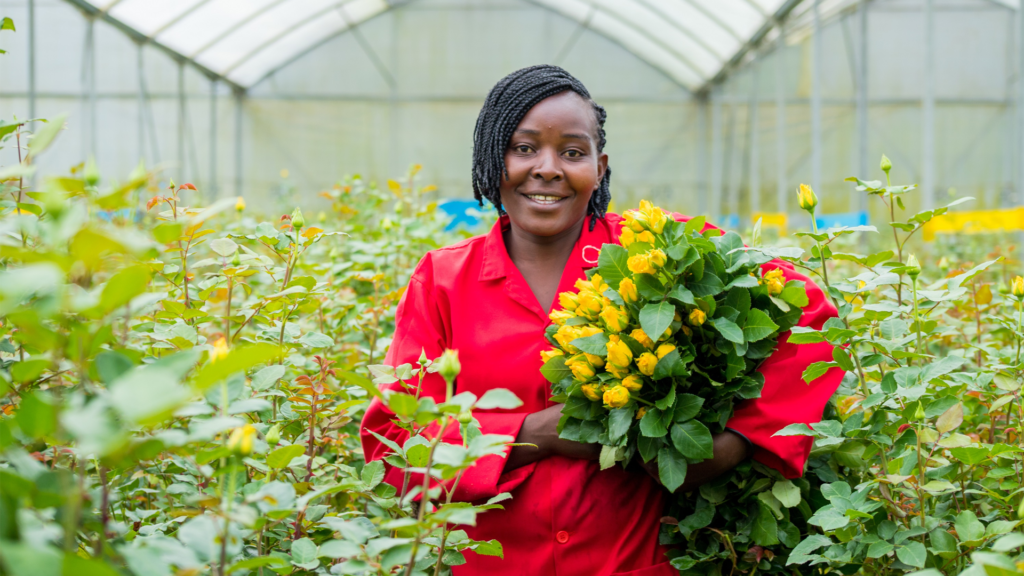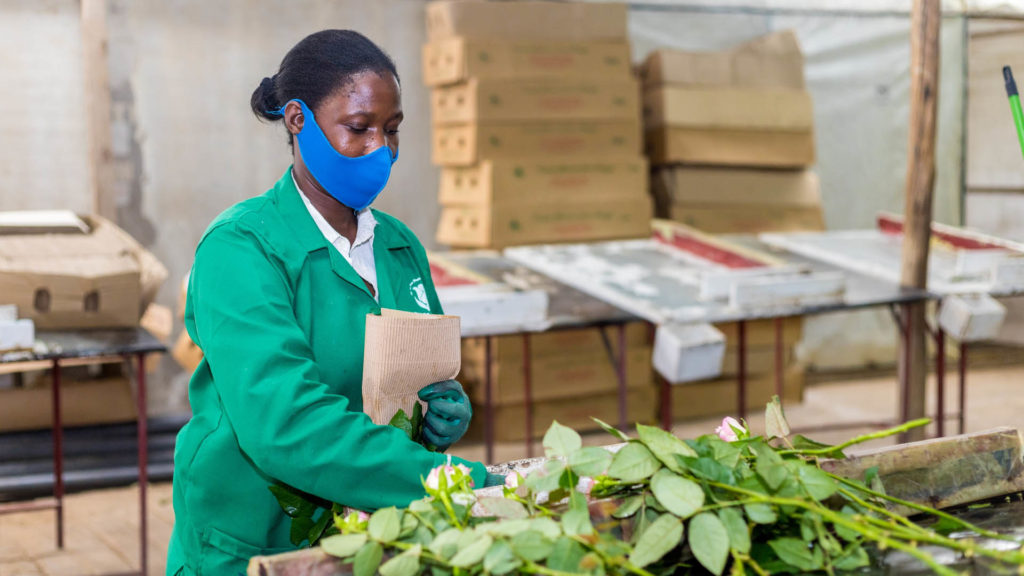With support from UK aid, the Fairtrade Foundation is working with partners to build hope in the flower sector and protect thousands of Kenyan flower workers and their families from the impacts of Covid-19.
‘We were not prepared for the pandemic and its effects… I was forced to cut on costs and prioritise spending on house rent and food: at some point it became a struggle to survive.’
Those are the words of Fairtrade flower worker Caroline Shikuku, from Tulaga Flowers, a flower farm in Kenya, as she reflects on how Covid-19 has disrupted her life, work and well-being. Caroline is one of the tens of thousands of Kenyan flower workers affected by the pandemic.
The outbreak has taken a heavy toll on the flower sector. Fairtrade Africa estimates over 90% of workers have been affected by the crisis, with issues including food insecurity, lack of personal protective equipment, poor access to hygiene facilities and job insecurity – all exacerbated by low or no wages and non-existent savings.
As the pandemic continues, the Fairtrade Foundation is running an ambitious new programme to protect Kenyan flower workers like Caroline from the worst effects of the crisis, and to promote a more sustainable, resilient sector.

Building resilience in flower supply chains
Launched in 2020, the Building Resilience in Flower Supply Chains programme is being jointly led by the Fairtrade Foundation and MM Flowers – using funding from the Covid-19 Vulnerable Supply Chains Facility (VSCF), established by the Foreign, Commonwealth and Development Office (FCDO).1
This £350,000 programme is being delivered in partnership with Fairtrade Africa, Co-op, Coventry University, FNET, M&S, Partner Africa, Tesco and Women Working Worldwide. Together, we will give direct support to 6,000 workers and farmers, helping them to meet their immediate needs during the pandemic, while also working to build resilience across the flower supply chain.
We will do this over the coming months, by:
- providing health protection and nutrition support to workers on both Fairtrade and non-Fairtrade farms;
- distributing health packages to workers and families at farms with the greatest needs: these packages include masks, soap, hand sanitiser, and paracetamol;
- introducing kitchen gardens so that workers can have reliable access to food for themselves and their families;
- piloting nutrition gardens on more than four farms;
- running research into alternative ways that flower workers can earn an income, giving seed funding and support to workers for these income generation activities;
- providing technical support so that farms can run projects aimed at diversifying their crops, so that they’re better able to withstand the effects of climate change and shocks to the market (as in the case of Covid-19);
- training workers on the importance of gender equality in relation to the impacts of Covid-19, so they are more aware of and better able to address issues relating to gender;
- running awareness raising campaigns to spread key health information to communities, through radio, SMS, and posters, which will reach up to 150,000 people.
Since social inclusion matters, we’re making sure that women and people with disabilities are prioritised, and we estimate that 100,000 women flower farm workers and their families are set to benefit from the programme activities.
A budding hope for the future
All these activities are designed to support an industry that has battled many obstacles over the past year. For instance, when the outbreak first began, it brought logistical challenges including restrictions on movement, grounded flights, higher export costs and cancelled orders, as retailers prioritised essential items. Flower sales across East Africa plummeted, and demand dropped to 20% of normal levels in April 2020 alone. All of this placed a big burden on an industry that employs an estimated 2 million people directly and indirectly, mostly women.
Although demand for East African flowers has now recovered a little, many pressures still remain, including ongoing challenges with air freight availability. The Kenya Flower Council has previously estimated that it would take a year for the sector to recover. That’s why the Building Resilience in Flower Supply Chains programme doesn’t just focus on workers’ short-term needs.
In the longer term, this programme will support the Kenyan flower sector to become more sustainable and more resilient to shocks like Covid-19, while protecting the security of the flower supply chain for UK retailers. For instance, programme partners will carry out research to understand the potential benefits of supporting fairly traded goods through supply chains.
We’ll share what we learn with retailers and others in the flower supply chain, to help encourage them to adopt fairer, ethical trading practices. We’ll also hold discussions with retailers and our partners in the private sector, as well as with the UK and Kenyan governments, so that we can shape policy that affects flower workers.
This is all possible thanks to £200,000 of funding from the FCDO, as well as £75,000 of cash match-funding from Co-op, M&S and Tesco, and almost £70,000 of in-kind funding.
Not only will this investment support and safeguard the wellbeing and livelihoods of flower workers, but it will also mean farms will be better equipped to keep running, and retailers will have a secure, stable supply of blooms going forward.
This can only be win-win for vulnerable flower workers and for responsible businesses. With this funding, and with the valued support of Fairtrade Africa to reach those producers, we will be able to protect the livelihoods of poor and vulnerable flower producers at this precarious time, and ensure that these industries are fairer and more resilient.
Notes
1. This project is funded by the Vulnerable Supply Chains Facility (VSCF), a rapid Covid-19 response fund set up by the UK Foreign, Commonwealth and Development Office (FCDO), and managed by Mott MacDonald Ltd. The Facility partners with 20 UK and international retailers and brands, and nine not-for-profit organisations, supporting over 100 suppliers across Bangladesh, Ethiopia, Ghana, Kenya, Myanmar, Tanzania, and Zimbabwe. It will provide economic, social, and health benefits to around 1 million women and men directly and indirectly.
